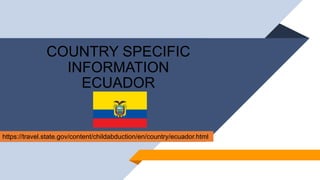Country Specific Information Ecuador
- 5. U.S. Embassy Quito • Ave. Avigiras E12-170 y Ave. Eloy Alfaro Quito, Ecuador • Telephone: +(593)(2) 398-5000 • Emergency After-Hours Telephone: +(593)(2) 398-5000 • Fax: +(593)(2) 398-5100 • ACSQuito@state.gov Consulates • U.S. Consulate General Guayaquil Santa Ana St. and Jose Rodriguez Bonin Ave. San Eduardo, Ecuador • Telephone: +(593)(4) 371-7000 • Emergency After-Hours Telephone: +(593)(4) 371-7000 • Fax: +(593)(4) 371-7045 • ACSGuayaquil@state.gov
- 6. Destination Description See the Department of State’s Fact Sheet on Ecuador for information on U.S. – Ecuador relations. 6 2 https://www.state.gov/r/pa/ei/bgn/35761.htm
- 11. Safety and Security WE CAN • help you find appropriate medical care • assist you in reporting a crime to the police • contact relatives or friends with your written consent • provide our information on victim’s compensation programs in the U.S. • help you find accommodation and arrange flights home • replace a stolen or lost passport Victims of Crime: Report crimes to the local police by calling 911. In Quito, you can visit an Ecuadorian Tourist Security Service Attention Center. You should also contact the U.S. Embassy at +593-2- 398-5000 or the U.S. Consulate General at +593-4-371-7000. See the State Department’s webpage on help for U.S. victims of crime overseas. Information about victim’s assistance programs in Ecuador is available on the Mission Ecuador website.
- 12. Safety and Security Domestic Violence: U.S. citizen victims of domestic violence may contact the Embassy or Consulate General for assistance. Civil Unrest: Demonstrations occur frequently. Protesters often block roads and sometimes burn tires, throw rocks, and damage other personal property. • Police may respond using water cannons and tear gas. • Avoid demonstrations and prepare back-up transportation plans. Even peaceful demonstrations can turn violent with little or no warning. Messages regarding demonstrations and strikes, explosive device/suspicious packages, and weather-related events are posted on Mission Ecuador’s website.
- 14. Local Laws & Special Circumstances Criminal Penalties: You are subject to local laws. If you violate local laws, even unknowingly, you may be expelled, arrested, or imprisoned. • Penalties for possessing, using, or trafficking in illegal drugs in Ecuador are severe. Offenders can expect long jail sentences and heavy fines. • Never agree to carry a suitcase or package through customs for anyone. . Seismic Activity: There are numerous active volcanoes, and earthquakes are common. Earthquakes can trigger deadly tsunamis. Visit Ecuador’s National Risk Management Secretariat and the Ecuadorian Geophysical Institute for more information. • Mud or lava flows from Tungurahua volcano could pose a significant and immediate threat to travelers in Baños. • The town of Latacunga is directly in the path of potential mud or lava flow from the Cotopaxi volcano. Even small emissions from the volcano can trigger avalanches and landslides. Low lying areas in the greater Quito area could also be affected if Cotopaxi erupts. • In the event of a natural disaster, pay attention to the news media for updates.
- 15. Local Laws & Special Circumstances Ayahuasca: The active ingredient of ayahuasca, DMT, is illegal in the United States and Ecuador. Tourists engaging in recreational use of ayahuasca have died from its effects and been victims of robberies and assaults. Galápagos Islands: Be aware of the following challenges: • Many Ecuadorian tour vessels operating in the Galápagos do not meet international safety standards. • The two hospitals, on Santa Cruz and San Cristobal Islands, do not perform major medical procedures. • Serious injury or illness in the Galapagos typically requires medical evacuation to the Ecuadorian mainland or the United States. This can cost $60,000 or more and take significant time to arrange. We strongly recommend you purchase traveler’s health insurance that includes air evacuation. Arrest Notification: If you are arrested or detained, ask police or prison officials to notify the U.S. Embassy or U.S. Consulate General immediately. See the State Department’s webpage for further information.
- 17. Travel & Transportation Road Conditions and Safety: Some roads are poorly maintained and may lack crash barriers, guard rails, signs, and streetlights. Heavy fog and rain make conditions more treacherous. • Due to a lack of sidewalks, many roads are also used by pedestrians. • Slow-moving buses and trucks frequently stop in the middle of the road unexpectedly. • In rural areas, you may encounter livestock in the road. • Many vehicles are poorly maintained and breakdowns are common. Traffic Laws: You may use your U.S. driver’s license for up to 90 days. If you are staying in Ecuador longer, you should contact the National Transit Agency to obtain a valid driver’s license. • Drivers often disobey traffic laws and signals. They rarely yield to pedestrians and cyclists. • If you are involved in an accident, even if you are not at fault, you may be taken into police custody, especially if there are injuries or if you do not have insurance. If the injuries or damages are serious, you may face criminal charges. • You might encounter intoxicated drivers. Chances of a drunk-driving accident are higher on weekends and Ecuadorian holidays.
- 18. THANKS

















